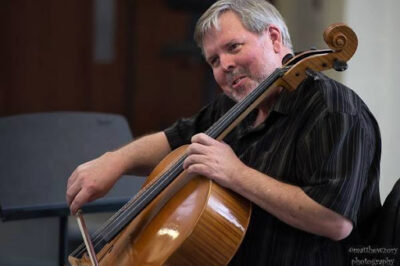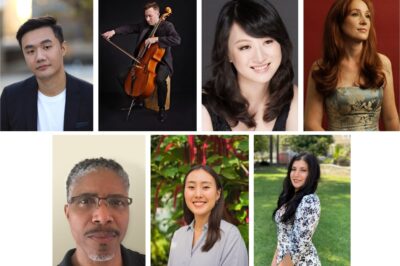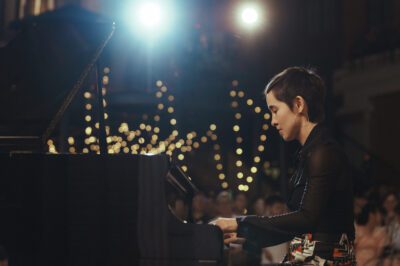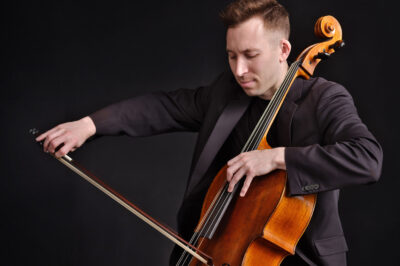Nic Gerpe
Piano faculty member, Nic Gerpe, recently participated in the Ojai Music Festival for the first time and is an upcoming core artist for the Piano Spheres. He’s worked at PCM since 2006 and is the co-founder and curator for PCM’s concert series, Wicked GOAT. Read on to learn more about these events and how he brings these experiences into his teaching.
This interview was conducted on 7/12/24 and has been edited for length and clarity.
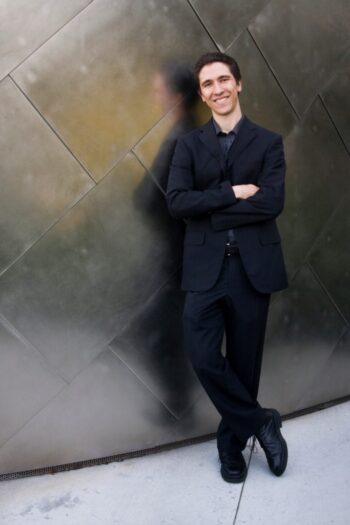
You have a lot of recent accomplishments, from being a new core artist for the Piano Spears to playing the recent Ojai Music Festival. Can you talk about any highlights or challenges from these experiences?
It was my first time playing for the Ojai Music Festival which has been around since the mid-50s. They’ve always heavily emphasized modern music and many of their artistic directors and composers have been an integral part of the festival. It was also my first time playing a harmonium. We played the famous Prelude to the Afternoon of a Faun by Debussy, though originally written for a full orchestra, this was arranged for a large ensemble. This was common in post-World War 1 years because nobody had money for big concerts. So for this festival, the harmonium’s role was to sometimes play the horn part or the woodwinds. It was really fun to play a new instrument, and the other players were amazing. They were members of the Mahler Chamber Orchestra, a collective of 40 musicians from 20 different countries who tour together. And it was great to meet with the artistic director of the festival, Mitsuko Uchida, the pianist. I was a very, very, very small part of a big whole, but it was really wonderful and fulfilling.
In terms of Piano Spheres, this upcoming year is their 30th season. Their core mission was to present concerts that featured modern piano music by up-and-coming composers. In 2015, they started the Satellite Series where the original artists invited a young up-and-coming pianist to mentor and present a recital. They had four original members including former PCM piano faculty, Susan Svrcek. She passed away a few years ago, but I’ve known her since I was a student at PCM and always really looked up to her. She was already a great mentor and friend, so I was honored when she asked me to be in the Satellite Series.
And as the other original core artists are going into emeritus status, they’re inviting new people to fill those shoes. They asked me if I’d like to join as a core artist which is such an amazing honor I’m having trouble fully processing that it’s real. My first recital for them as a core artist will be next March.
How has your experience with new music specifically shaped your playing?
When I went to USC, I told my teacher I wanted to focus on new music, and she was super supportive but said I also have to learn the standard repertoire with equal skill and facility. At the same time, I was working with student composers and premiering new music which led me to USC’s Contemporary Music Ensemble which led to working with faculty composers. That opened up a lot of doors for me. I’m still connected to some of those people. There were a lot of incredible, formative opportunities for me as a student to perform with different ensembles and players in various venues.
I love playing new music because there’s less guidance and fewer expectations. One of the things that I love about playing new music is having the chance to bring a new composition to life, and there is a lot of freedom and flexibility involved in interpreting a new work. The flip side though is that just as you would approach a classical piece, it’s important to respect the composer’s intentions. There is a very special sense of collaboration with the composer involved in premiering a new piece. Just as you would approach a classical piece, it’s important to respect the composer’s intentions.
It’s also great to work with the composer directly. Imagine how cool it’d be to shoot an email to Brahms and say hey, in your G major violin sonata, how did you want this phrase to go exactly? With living composers, it’s possible and allows for a strong element of collaboration because we’re bringing something to life together.
That process helps me with older music because at some point, Chopin and Beethoven were contemporary music, and when they were alive, people didn’t always understand what they were doing. So I try to approach their music with an element of spontaneity.
And as a teacher, I want to instill all of these attitudes in my students. I want them to look at a piece of music regardless of what era it’s from and try to figure out the composer’s intention and figure out how to present it to an audience.
How have your variety of musical experiences influenced your teaching and vice versa? How has your teaching influenced your performance style?
When I started at USC, I felt like the low man on the totem pole compared to the top-notch players and teachers. That motivated me to work hard and constantly bring my A-game which greatly improved my playing. Now, I always tell my students to work with people who are more experienced so they can work hard to rise to those challenges. This also means I set high expectations while trying to instill a love for music in my students.
Then vice versa, by instilling a love for music in my students, it helps maintain and grow my love for music. This is also true for the technical elements I teach my students. In having to articulate good practice techniques and time management skills, I had to actually have a clear idea of what this was for me. Working with my students to create a practice schedule and list of goals reminds me to do the same for myself. It helped me understand that there is an efficient way to practice with a busy schedule and tight deadlines. It’s nice to have that skill because then I can pass it on to someone else. This is the same for musicality and phrasing. Overall, helping people address technical issues helps me with my techniques because it forces me to view it in an analytical way.
You started the Wicked Goat series in 2022 at PCM. How has that been going and what are your visions for the future of the series?
It’s been beyond my expectations. Megan Shung and I started the series for two reasons. One was to make modern music an integral part of the lives of our community by giving them a highly energetic, intriguing, and welcoming concert-going experience. And the second part of our objective was to bring the larger L.A. music community to PCM. We focus on local and living composers and we invite guest performers who play with various ensembles like the Lyris Quartet, L.A. Phil, Eclipse Quartet, Brightwork New Music, etc. Each program has a theme, so we pick pieces that fit, and we’re able to tell a story that way.
People have been enjoying it, and the concerts always sell out. A cool moment from last season came from one of the composers whose music we featured, Paul Moravec. He is a Pulitzer Prize-winning composer from New York, and he couldn’t be at the concert. Instead, he recorded a short intro video about his piece, which we are able to share with the audience. The other three composers on the program were in attendance and talked about their pieces live.
This past season Katelyn Vahala, another member of the PCM piano faculty and Piano Sphere’s emerging artist, joined me as the co-curator and she’ll do it again for the next one.
My goal for the series’s future is to keep that momentum going and just build on it. We’ve got so much interest in it and it’s so exciting when I go out and colleagues and friends ask about when the next concert is. I can’t reveal next season’s themes but let’s just say the music will be very fun.
I also want to incorporate more technology and multimedia. We have a nice projector and sound system and one year we had cool video backdrops for each piece and we’ve also had electronic elements in the composition.
In terms of multimedia, last season there was a piece based on a Shakespeare play so we had one of the PCM board members, Jane Kaczmarek, narrate the lines from the play before each movement.
There are all kinds of possibilities and ideas kicking around. I love my planning meetings with Katelyn because she’s so creative and imaginative and we’ll come in with so many different ideas for the two concerts we need to fill and it’s so hard to pick. But that’s a good problem to have.
